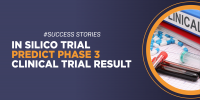Dr. Duruisseaux from the Hospice Civil de Lyon (France) prospectively replicated a three-year long phase 3 trial (FLAURA 2) with an in silico trial executed on 5000 virtual patients, in few weeks. Days before the official release of the phase 3 FLAURA 2 results, he posted the promising results of the in-silico prediction on X, formerly Twitter, which closely resembled the real-clinical trials, albeit at fraction of time and cost.

Nowadays, clinical trials are a mandatory step to ensure the safety and efficacy of a drug or a medical device before it becomes available to patients. However, their regulation evolved, becoming more stringent during the 60s because of the notorious thalidomide case. Thalidomide is a drug first marketed in West Germany as a remedy against nausea, anxiety, and morning sickness and was considered utterly safe for pregnant women. At the time, clinical trials were commonly realised, but only with a lower level of supervision from government agencies. That low level of supervision ultimately caused more than 10.000 cases of severe congenital abnormalities, leading to the death within months of approximately half of the babies affected.
The aftermath of the thalidomide case brought about a drastic change in clinical trial policies, leading to the current regulations where government authorities' approval and supervision of clinical trials are mandatory. This change undoubtedly improved drug safety, but it also led to a significant increase in the time and financial investments required to bring a new drug or medical device to market. However, the emergence of in silico trials, which utilise computer modelling and simulation, offers a promising solution to the drawbacks of traditional clinical trials.
A compelling demonstration of the potential of in silico trials was presented by Dr. Michael Duruisseaux of Hospice Civil de Lyon, France. He replicated a traditional clinical trial, known as FLAURA2, conducted by a pharmaceutical company to study the effectiveness of extending the progression-free survival of patients with non-small cell lung cancer. This trial involved the administration of an oral medication, osimertinib, which blocks tumor growth, with or without chemotherapy that kills new tumor cells.
The in silico trial, employing 5000 virtual patients, was designed on public domain demographic data of 30 real patients from the early stages of the FLAURA 2 trial. The computer-based trial was conducted on the software platform and the disease model, developed by the French-American startup Novadiscovery. Dr. Duruisseaux presented the in silico prediction three days before the official publication of the FLAURA2 trial results at the annual World Conference on Lung Cancer. The prediction was also disseminated on X, formerly Twitter.
The in silico trial not only prospectively predicted the clinical trial outcome in terms of the benefit of combination therapy (oral medication + chemotherapy), but also closely resembled the trends on lowered risk of disease progression or death in patients under combination therapy: 38 % (in-silico trial) vs 40% (conventional clinical trial). Such close alignment was also noted in progression-free survival for oral medication with chemotherapy combination, compared to the oral medication alone.
On the other hand, a significant difference between the traditional trial and the simulation concerns the resources employed to execute the in silico trial. The original FLAURA2 trial took 33 months to be completed. In contrast, the computer simulation-based trial provided the results in just one hour and at a fraction of the cost.
The above evidence shows that in silico trials can be efficient and effective in predicting the results of traditional trials, and they can be used to optimise their design, leading to accelerated, cost-effective, and safe drug development for everyone.
References: